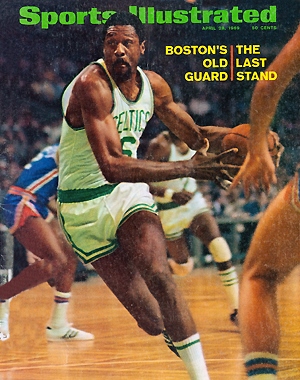|
 "I
got most of my rebounds before they even took their shot." "I
got most of my rebounds before they even took their shot."
-- Bill Russell
During one NCAA basketball tournament, CBS ran a commercial (over and over) with former Boston Celtic and University of San Francisco
champion Bill Russell. Russell discusses knowing his opponents, their strengths, their
weaknesses, what they wanted to do with the
ball, what they didn't want to do, and so on. His defense was to take his opponents off their game, and make them play his game. And
if Russell is any measure, defense wins championships.
It's commonly held that winning poker is aggressive poker. I certainly agree, but simply being aggressive is simply simplistic.
Winning poker is also about defense. It's about taking players off their game. It's about making them play your game. Making players
play your game is both complex and sometimes awfully simple. The most common "defense" poker tactic is "raising to get
a free card." While this play also happens to be one of the most often mangled, backfiring plays in all of poker, when it works,
it's a beautiful conception. For one unit of betting you get
to see two cards, rather than seeing those two cards for two units of betting, and if you do happen to make your hand, the pot has
more money in it. You have to love finding those win/win situations.
Defense comes in many other forms too. You can change the tempo of a game to suit your preference, or un-suit the preference of a key
player at the table. You can make a raise in position
with a normally non-raising, speculative hand because your opponents may likely check the flop to you, giving you a free card again.
And of course, you can fold rather than mix it up in a pot.
As much as possible, a winning player should be sitting in games most suited to his or her style. Sometimes all it takes is making a
sacrifice, intentionally losing bets or pots, to turn a
sleepy, dead game into a real barnburner. Those sacrificed bets are an investment in the game, but more than that, they are an act of
defense. Don't let the other players make you play their game.
 Getting back to
aggression, it's a cliché to say the best offense is a good defense. What is not often said is the best defense is a good offense. Sometimes this is true.
I think of two historical examples. The first is well known from World War I. Marshal Foch of France found himself in a desperate, besieged situation.
His response: "My center is giving way, my right is in retreat; situation excellent. I attack!" More obscurely, during the Russian Revolution,
months of bloody civil war raged between the "whites" (czarists) and "reds" (communists), with the German army thrown
in for good measure. Besides these warring groups, there were many peasants who, quite rightly, despised all three. Some Ukrainian peasants
gathered into army around a charismatic anarchist, Nestor Makhno. Makhno temporarily allied with the communists whenever a czarist or German
enemy was a threat to both, but when the communists were in a position to betray their allies, they did. At Peregonovk, a band of 125 of
Makhno's cavalry were surrounded by twenty times as many czarists, and initially looked like they would be annihilated. What to do? Attack,
of course! And rout the bewildered, unprepared-for-an-attack enemy. Getting back to
aggression, it's a cliché to say the best offense is a good defense. What is not often said is the best defense is a good offense. Sometimes this is true.
I think of two historical examples. The first is well known from World War I. Marshal Foch of France found himself in a desperate, besieged situation.
His response: "My center is giving way, my right is in retreat; situation excellent. I attack!" More obscurely, during the Russian Revolution,
months of bloody civil war raged between the "whites" (czarists) and "reds" (communists), with the German army thrown
in for good measure. Besides these warring groups, there were many peasants who, quite rightly, despised all three. Some Ukrainian peasants
gathered into army around a charismatic anarchist, Nestor Makhno. Makhno temporarily allied with the communists whenever a czarist or German
enemy was a threat to both, but when the communists were in a position to betray their allies, they did. At Peregonovk, a band of 125 of
Makhno's cavalry were surrounded by twenty times as many czarists, and initially looked like they would be annihilated. What to do? Attack,
of course! And rout the bewildered, unprepared-for-an-attack enemy.
I often think of Foch and Makhno when shortstacked in a tournament -- meaning I often think of Foch and Makhno! Most players "nurse" a
shortstack. The better plan is simple -- attack!
You cannot survive long with so few chips. Your opponents have all the chips. So, go get them! Attacking here is totally defensive. You are on
the endangered species list and need to survive. Your enemies on the other hand, with their medium and big stacks, don't want a fight against
an aggressive attacker. They have enough chips to let you steal their blinds without it mattering to them, or give up a pot on the flop.
They are "soft underbelly" foes. Attack!
Defensive tactics come in many shapes and sizes. Many of
these stem from a root much like what Bill Russell talked about: strategically win confrontations before they are even fought. Make
your opponents fight on your turf, on your terms, when you want to. Or have them turn and run. You win either way.
See also Playing for the Long Run,
Poker Memory and
YA Tittle and Losing Poker |

